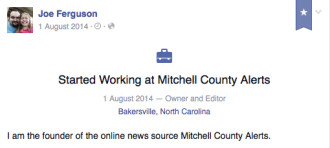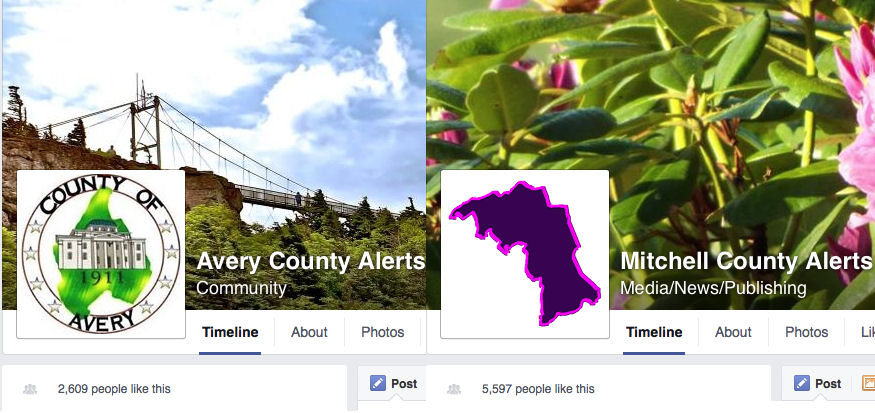A new paradigm for community news may be emerging in Western North Carolina’s famously independent and insular rural counties, traditionally served mainly by small weekly newspapers. Thousands of people in these sparsely populated areas are now getting up-to-the-minute local news via Facebook.
In the past year alone, almost a dozen local alerts pages (some with affiliated websites) have cropped up in various rural counties in the region, and some are already attracting followers in numbers comparable to the established print outlets’ circulation figures.
The shift reflects a national trend: According to a Pew Research Center study published last fall, 30 percent of adult Americans now get news through the popular social media giant.
So far, the local ventures are mostly labors of love rather than lucrative businesses. And many of these groundbreaking low-tech operations owe their existence to one man, his radio scanner and boundless energy. But their swift rise and growing acceptance raise significant questions about the future of local news in WNC and beyond.
The face behind the Facebook page
Established Aug. 2, 2014, the Mitchell County Alerts Facebook page boasts 5,597 followers. And even if not all of them are county residents, the total number of “likes” is significant in a county with 15,000 people. According to the “about” page, the content includes “critical alerts, traffic announcements, weather announcements, amber alerts, arrest reports, upcoming events and meetings, and other information.” The page is fed by a website of the same name, and both draw the bulk of their info from radio scanner traffic and weather radio reports.
Avery County Alerts is also built around radio scanner information, supplemented by a generous helping of heavy-handed political opinion. Recently, for example, a rudimentary drawing of a man jabbing a knife into his own eyeball carried the caption “still more effective than voting.” This page has a smaller following (2,609 likes) — still substantial in a county with about 18,000 residents. And so far, at least, its affiliated website offers only a curious selection of videos and a live scanner traffic feed.
That, though, is only the beginning: The roster of recent arrivals also includes Avery Voice, Burke County Alerts, Madison County Alerts, McDowell County Alerts, Yancey County Alerts, Watauga County Alerts and Watauga Voice. Some host significant activity; others show very few posts or followers.
It’s not readily apparent who administers all these pages, but a key player turns out to be Mitchell County resident Joe Ferguson, an information technology specialist in his early 30s. Despite having no background in journalism, he’s founded more than half of them.
“When I first started [Mitchell County Alerts], I didn’t know how the community was going to take it,” Ferguson explains. “I did run anonymous for a while, but most people were beginning to figure out that I was doing it anyway,” so he no longer tries to hide his identity.
“With the recession and the way jobs down here in the IT sector are and my inability to find work,” he recalls, “I created the page to give myself something to do and keep me from going crazy. I started this as a hobby, and it’s just turned into something that I look at as becoming a job.” Before he knew it, Ferguson found himself involved with a number of other pages, too, and keeping up with them all has been a challenge. Ferguson says he spends most of his time on Mitchell, does Yancey when he has can, but does little or nothing with the other pages.
Ferguson’s formula seems to be part journalism, part community input. “I think it’s important that the community provide each other with information,” he explains, adding, “Sometimes our neighbors are our best source.”
Judging by the comments on Mitchell County Alerts, what people like is its approachability and interactivity. On June 1, for example, Ferguson posted about a pedestrian struck by a car on N.C. 226. He didn’t provide much information, but someone who claimed to have been at the scene and two self-identified extended family members of the victim left additional details in the comments section.
Seeing value in Facebook’s real-time nature, Ferguson believed his service could be local people’s best source of up-to-date information. “Citizens want to be able to know what’s going on in their community when it happens,” he says, “and they don’t want to have to wait until next Wednesday to read it in the paper — if it shows up in the paper.”

But is it news?
Both Avery and Mitchell counties are served by weekly papers. They show up on newsstands every Wednesday and have little or no online presence. Of the three local print outlets, only The Avery Journal-Times has a Facebook page (it boasts over 2,000 likes). The Journal-Times and the Mitchell News-Journal also have websites; the Avery Post has neither.
Each Avery paper prints 5,000 copies per week; the Mitchell paper prints 3,000 per week — numbers comparable to the readership of some of the brand-new alerts pages.
Journal-Times Editor Sam Calhoun says he’s not concerned about the local Facebook pages. Avery, he maintains, is different from other counties: Internet service isn’t up to current standards, and “People still do things on paper and in person.” Calhoun says his paper has remained successful even as the alerts pages have grown, because “It’s better to be right than to be first.” He believes the various alerts pages don’t have the same credibility his paper does, saying his readers understand that.
Avery Post Editor Bertie Burleson also seems unconcerned about the upstart news pages. “I think we still sell as many papers,” she notes. The Post, which also serves Mitchell County, covers a lot of local crime news, however, and she says that since Mitchell County Alerts began, the Sheriff’s Office has stopped sending her complete arrest coverage with photographs, which had been popular with readers. But Burleson says she doesn’t know if there’s any connection.
Mitchell News-Journal Editor and Publisher Andy Ashurst declined to comment on the alerts pages.
Ferguson says the response to Mitchell County Alerts has been mostly positive, but he acknowledges that his page “isn’t for everyone.” For one thing, he doesn’t hesitate to post public information such as arrest reports, saying he sees no difference between his publishing them and the newspaper’s doing so. Ferguson used to publish street addresses culled from emergency traffic and arrest reports, but he no longer does. “Some people feel like the information we post is putting law enforcement and first responders in danger,” he explains, and these days he often delays posting info concerning sensitive ongoing situations.
There’s also been negative response to arrest reports involving hot-button issues. On Sept. 4, 2014, for instance, Mitchell County Alerts posted an arrest report for a man charged with one count of cruelty to animals and two counts of misdemeanor child abuse, sparking a sensational and visceral comment battle. Some accused the page of invading the family’s privacy; others defended it, saying they’d merely posted public records.
“Some people don’t like to see their name in print when they get arrested,” notes Burleson, who says she’s had similar complaints.
Not surprisingly, however, Ferguson says his more sensational posts are the most popular. A recent item about an SUV striking a motorcycle on N.C. 226 reached 5,326 people, he reports.
Calhoun, meanwhile, says his impression of the news alerts pages is that “People visit them mostly for entertainment, but when they want solid news they can count on, they read The Avery Journal.” At the same time, he accuses the county’s other paper, the Avery Post, of practicing “what some might call yellow journalism.”
Both news outlets sell a similar number of papers, though, and since the alerts pages are free, people don’t have to choose between them and traditional print journalism.
Bad blood
Ferguson’s decision to reveal his identity last December was triggered by concern that people would think he was responsible for the Avery County Alerts page. He had editing privileges there and was posting things like weather and arrest reports.
But another administrator on the page began adding more political opinion posts, some of which were fairly extreme. Consider this one from Dec. 7, 2014: “Welcome to all the new members! I don’t mean to be rude but, if you came to support the local status quo and boot licking fascists that have been impersonating our government, you came to the wrong page.”
To distance himself from the trend, wrote Ferguson, “I felt compelled to … reveal my involvement in these pages. … I do not want my name being thrown around as the one behind all the anger and hate.”
Because of the page’s increasingly radical tone, says Ferguson, it lost over 600 followers in a week. And a review of many posts suggests that they’ve gotten even more political since then.
Asked about the situation, the administrator(s) refused to answer questions or submit a statement concerning the project.
Ferguson, however, answered a nearly identical set of questions. He also named Stephen Goble as the founder of Avery County Alerts.
According to Ferguson, all of these pages started up after he’d spoken with Goble, who wanted to launch a traffic reports page. But Ferguson was skeptical about traffic info providing enough content, and he’d already been posting weather news on his personal Facebook page.
“I guess you could say we kind of bounced ideas off of each other and created our pages roughly within a day of each other,” says Ferguson. Evidently, however, the two have chosen to run their pages differently, particularly since their public falling out in December.
Ferguson even launched a competing scanner-based report page, and he’s since recruited Dave Calloway Jr. to administer it. Calloway, an avid ham radio operator, says he “got involved with the Avery Voice page because I like keeping up with what’s going on on the police radios, and I think the public has the right to know what’s going on with public safety officials, regardless if they have a scanner or not.” Calloway also identified Goble as Avery Alerts’ main administrator.
Lately, though, Avery County Alerts seems to be recovering, having gained about 50 likes in one recent week.
And meanwhile, it wasn’t the first time a local news outlet controversy had expanded the county’s media landscape. According to Calhoun, the Avery Post was born out of a disagreement among Avery Journal-Times staffers. Burleson, though, says she started the Post after she “got bored” at the Journal-Times and wanted to do something with a different focus. “We print a lot more hard news,” she says, specifically crime coverage.
The Wild West
All the new alerts pages include weather and traffic info. But other local Facebook pages have been posting these popular items since at least 2010. One particularly successful one is Watauga County Road Conditions and Weather Updates. Inspired by a community traffic bulletin Facebook page he’d seen, Kenneth Reece took advantage of social media’s update-friendly format to start his own alerts service. He began posting traffic and weather news during a hard December and, in the first month, saw about 1,000 likes per week.

Applying his experience as a radio broadcaster and his grasp of mass media, Reece has created a very popular page that’s community-driven despite being administered by just one person. Users regularly submit information and updates that help him stay on top of local news.
Getting to this point wasn’t easy, however. “Even though I thought I knew what I was doing,” he recalls, “it really was the Wild West.” In addition to weather and traffic info, Reece sometimes covers high-impact stories, such as the student deaths at Appalachian State University last fall and winter. “If it’s a huge interest story here, folks want to know, and they want to know right then,” he explains.
Like Ferguson and Goble, Reece launched his Facebook project anonymously, but when he expanded to a website 10 months later, he realized that attaching his name to it boosted the outlet’s credibility. Reece says his ability to provide good coverage “goes back to getting the trust I’ve gained with law enforcement.”
Early on, he found advertisers who recognized the value of his niche market; content, Web traffic and advertising on his site have grown each year.
Reece no longer works in radio, but thanks to his dedication to the online project, the time he’s put in and the community support, he says he’s now close to making a living from it. The downside, though, is that he can never take any time off.
These days, Reece continues, information on social media seems to be gaining wider acceptance. “People have come to expect that I will know what’s going on and post the information, if it’s a power outage or a flood or just some minor thing.”
Asked about the newer alerts pages, Reece says he doesn’t think they’ve yet achieved comparable credibility, adding, “I’m not knocking what they’re trying to do … but I don’t follow them very closely.”
Meanwhile, across the country, a few Facebook news pages have manged to achieve considerable reach. In Illinois, LaSalle County Bulletins & Alerts boasts 19,000 likes. Mirroring the experience of the local sites mentioned here, the page does not disclose the names of its six administrators (including a specialist who covers only lost and found pets). But as one of them wrote in response to a Facebook query, “We are a smaller, rural area. It’s hard to find someone who you do not have a mutual friend with on Facebook.”
The LaSalle page, too, got its start because the founders had access to radio scanner information that they thought would be of interest to the broader community. Unlike Mitchell County Alerts, however, the LaSalle team says they’re not trying to make money: They simply want to give back to the community. The administrator who responded to the query called it “a thankless job with no pay and plenty of headaches” but ended the message with a smiley face.
For his part, Ferguson feels he’s built something important and takes to heart the responsibility that comes with his newfound voice. “Once I saw the acceptance in the community and how much they enjoyed it and depended on the information, I realized that, hey, this is something good that I need to dedicate myself to, try to provide the best information I can, and do it as professionally as I possibly can.”
And though he can’t pay himself anything yet, Ferguson says some local businesses are interested in advertising with him. “The Internet is really changing the way everyone lives their life and accesses information,” he says. “I think online news will eventually take a lot of business away from paper news sources.”
And looking ahead, he continues, “I’ve positioned myself at the right time and the right place to make pages that, whether it’s controversial or not, make an impact on the community.”




Before you comment
The comments section is here to provide a platform for civil dialogue on the issues we face together as a local community. Xpress is committed to offering this platform for all voices, but when the tone of the discussion gets nasty or strays off topic, we believe many people choose not to participate. Xpress editors are determined to moderate comments to ensure a constructive interchange is maintained. All comments judged not to be in keeping with the spirit of civil discourse will be removed and repeat violators will be banned. See here for our terms of service. Thank you for being part of this effort to promote respectful discussion.